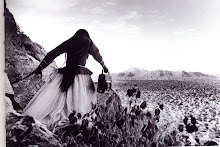I felt especially nervous because unlike most all of the radio students, I was behind in my work (thanks to the 20-30 hours of audio I had collected) to the point I had not yet shared any audio version with anybody. So I had not yet had any feedback, whereas most folks had already shared their stories several days earlier to other radio students. The way Salt teaches, you focus first on perfecting your script, your paper version, before you get to work in Protools-- essentially your story's laid out before you and your next steps are to make your audio clips, record narration, and mix it together (oh, so easy-- please read the intense sarcasm)
I started my ProTools session at 8am on Wednesday morning (I had already lined up my audio & made my cuts), so started the piece at 8am and finished (the draft that I shared today) at 3am the next morning.
A word about narration-- a misguided radio class T.A. in 2004 told me I sounded like a British robot (??? I know!) when I did narration. Though five years older (wiser?) now, I still dread, and I mean DREAD narration. (That TA, like a mean boy you once liked-- you never forget what they said and they, to this day, have no idea you still carry those words with you).
Narration: I read my entire narration three times. I put up the photographs of two friends (who are looking at the camera when the photo was taken) at my eye level, so when I read my narration, I was looking at them, to try to help me feel natural, like I was talking to them on the phone. Ira Glass spoke at the Merrill Auditorium in Portland a few days ago and said your narration should sound like you're talking to your best friend late at night in bed on the phone-- that kind of intimacy given to the radio listener. The first time, I just read my words straight through (I had already obsessed on trying to make my word choice sound conversational). The second time, I read "over the top", smiling the whole time, and even outloud pretending to be my friend asking me the question that my narration was trying to answer. And for the third time, the time that would be the most successful (no one called me a British robot, actually I was complemented on my voicing). I listened to my favorite Lil Wayne song and danced and sang it out as loud as I could. As soon as the song finished, I went straight into my third read.
Actually, in one of Davia's workshops she referenced the brilliant Brian Eno http://www.odemagazine.com/doc/57/freestyling/ and his article about the power of singing in our lives. I have a terrible voice (once I was booed while singing kareoke) but Lil Wayne definitely helped with my narration as a radio producer.
And so out of those 20-30 hours of recorded tape, I came in just under 10 minutes (including my host intro)
One of my favorite sounds is my recording of hundreds of periwinkle snails spitting out ocean water (my story has a lot to do with periwinkle snails)
The voice of snails! Who knew!
Tomorrow, early, early morning (Saturday April 25th) to Boston for the Megapolis (Audio) Festival.
with love, Alix
 This is me at 8:30 in the morning after going to bed at 3:30, from working on my audio story until 3 am.
This is me at 8:30 in the morning after going to bed at 3:30, from working on my audio story until 3 am.I am very tired!!





